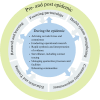Schools of public health as a cornerstone for pandemic preparedness and response: the Africa COVID-19 experience
- PMID: 39574151
- PMCID: PMC11583413
- DOI: 10.1186/s12992-024-01087-z
Schools of public health as a cornerstone for pandemic preparedness and response: the Africa COVID-19 experience
Abstract
Background: The Coronavirus disease (COVID-19) pandemic caused significant morbidity and mortality in Africa, in addition to other socio-economic consequences. Across the continent, Schools of Public Health (SPHs) played several roles in supporting national, regional, and global response to the pandemic. Following a published and grey literature search, this paper reviews and analyses the contribution of SPHs in Africa during the COVID-19 pandemic.
Contribution of the schools of public health: SPH faculty in most countries contributed their expertise through COVID-19 task forces and advisory committees where they guided and supported decision-making. Faculty also supported the identification, review, and synthesis of rapidly evolving global and local evidence, adapting it to the local context to guide policy decisions. Through research, SPHs contributed to a better understanding of the disease epidemiology, response interventions, as well as prevention and control measures. SPHs engaged in training field epidemiologists, frontline health workers, and district response teams. SPH staff, students and field epidemiology trainees also supported field activities including surveillance, contact tracing, as well as managing quarantine facilities and points of entry. SPHs engaged in public education and awareness-raising initiatives to share information and dispel misinformation. In partnership with other stakeholders, SPHs also developed important innovations and technologies.
Conclusion: SPHs are a critical pillar for pandemic prevention, preparedness, and response, that support health systems with important functions. To further enhance their capacity, efforts to improve coordination of SPHs, strengthen collaboration among schools, harmonize training and curricula, and enhance capacity for advanced research are needed. There is also a need to bridge the inequities in capacity and resources that exist among SPHs across regions and countries.
Keywords: Africa; COVID-19; Research; Schools of public health; Training.
© 2024. The Author(s).
Conflict of interest statement
Declarations. Ethics approval and consent to participate: Not applicable. Consent for publication: Not applicable. Competing interests: The authors declare no competing interests.
Figures
References
-
- Kapata N, Ihekweazu C, Ntoumi F, Raji T, Chanda-Kapata P, Mwaba P, Mukonka V, Bates M, Tembo J, Corman V. Is Africa prepared for tackling the COVID-19 (SARS-CoV-2) epidemic. Lessons from past outbreaks, ongoing pan-african public health efforts, and implications for the future. Int J Infect Dis. 2020;93:233–6. - DOI - PMC - PubMed
-
- Kohnert D. On the socio-economic impact of pandemics in Africa-Lessons learned from COVID-19, Trypanosomiasis, HIV, Yellow Fever and Cholera. Trypanosomiasis, HIV, Yellow Fever and Cholera (May 6, 2021) 2021.
-
- Diallo I, Ndejjo R, Leye MMM, Egbende L, Tusubira A, Bamgboye EA, Fall M, Namuhani N, Bosonkie M, Salawu MM. Unintended consequences of implementing non-pharmaceutical interventions for the COVID-19 response in Africa: experiences from DRC, Nigeria, Senegal, and Uganda. Globalization Health. 2023;19(1):1–16. - DOI - PMC - PubMed
Publication types
MeSH terms
LinkOut - more resources
Full Text Sources
Medical
Research Materials


